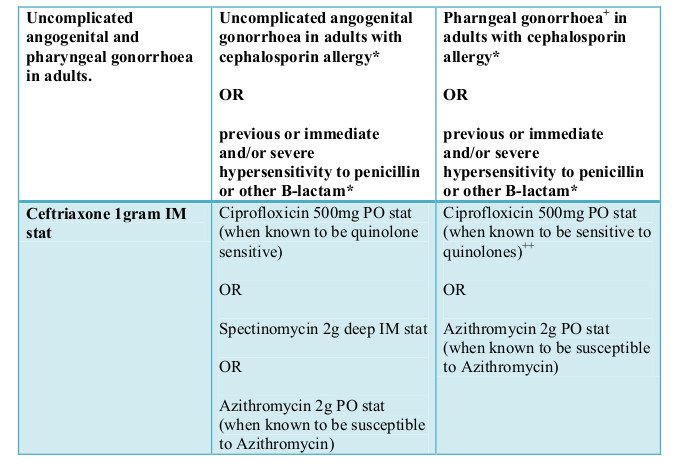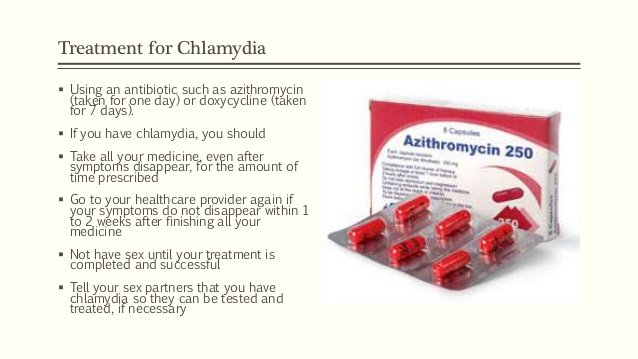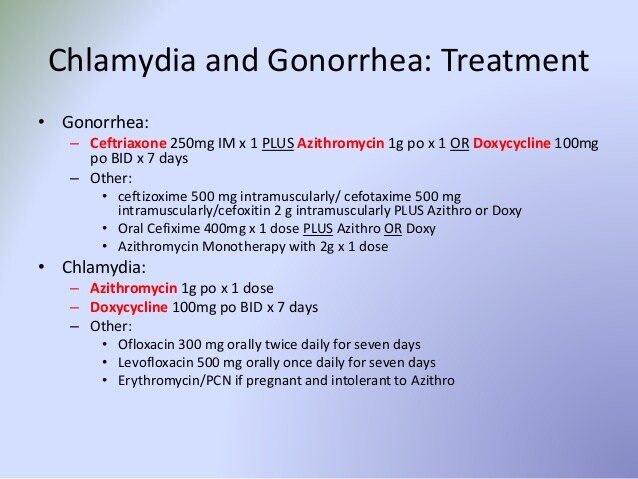Getting Treated For Chlamydia And Often Gonorrhea
If you have your own doctor, he will prescribe the antibiotics you need to treat chlamydia. If you dont have your own doctor, you can often find free or low-cost care at either a Planned Parenthood site or a community health clinic.
Listen carefully to the instructions for taking the medicine that you are given by the doctor or other healthcare provider, and follow them closely.
Ask questions if you dont understand something. Also, if you have other questions as you take your medicine, you can always call the pharmacist for help. They are often easier to reach than the doctor.
If you test positive for chlamydia, your healthcare provider is likely to also recommend that you be treated for gonorrhea. This is because the cost of treating gonorrhea is less than the cost of testing for the infection.
What Is The Treatment For Gonorrhea
Gonorrhea can be cured with the right treatment. CDC recommends a single dose of 500 mg of intramuscular ceftriaxone. Alternative regimens are available when ceftriaxone cannot be used to treat urogenital or rectal gonorrhea. Although medication will stop the infection, it will not repair any permanent damage done by the disease. Antimicrobial resistance in gonorrhea is of increasing concern, and successful treatment of gonorrhea is becoming more difficult. A test-of-cure follow-up testing to be sure the infection was treated successfully is not needed for genital and rectal infections however, if a persons symptoms continue for more than a few days after receiving treatment, he or she should return to a health care provider to be reevaluated. A test-of-cure is needed 7-14 days after treatment for people who are treated for a throat infection. Because re-infection is common, men and women with gonorrhea should be retested three months after treatment of the initial infection, regardless of whether they believe that their sex partners were successfully treated.
Is Treatment Different For Pregnant Women With Gonorrhea
The medications used for pregnant women with gonorrhea are essentially the same as the medications used for non-pregnant women.
Treatment is necessary to prevent disease transmission to, or complications for, the baby.
Gonorrhea in babies often manifests as conjunctivitis, or pink eye. Some states require that all newborns are given antibiotic eye drops, such as erythromycin, as a preventive measure against the disease.
Pregnant women who are diagnosed with gonorrhea should be tested for other STIs as well.
Recommended Reading: Can You Cure Chlamydia Naturally
Treated With The Same Type Of Antibiotic
Sexually transmitted infections tend to be something that we dont like to talk about. Despite how common they are, there is still a stigma attached to STIs and a lot of shame and embarrassment around testing positive. Perhaps youre worried about how to tell your partner, or how previous partners will react to the news. Whatever happens, youve done the right thing in getting tested and being honest about it.
Gonorrhea and chlamydia are two common sexually transmitted infections. They are both caused by bacteria and treated with the same type of antibiotics. In many cases, they dont cause symptoms, especially with chlamydia, so its possible to have an STI without knowing. This is how theyre so easily spread, because there are no warning signs.
Order safe treatment for chlamydia
How Can I Prevent Chlamydia

It’s easier to prevent an STI like chlamydia than it is to treat it:
- Don’t have more than one sex partner at a time. The safest sex is with one partner who has sex only with you. Every time you add a new sex partner, you are being exposed to all of the infections that all of their partners may have.
- Use a condom every time you have sex. Latex and polyurethane condoms keep out the viruses and bacteria that cause STIs.
- Be responsible. Don’t have sex if you have symptoms of an infection or if you are being treated for an STI.
- Wait to have sex with a new partner until both of you have been tested for STIs.
Don’t Miss: What To Take For Gonorrhea And Chlamydia
Rationale For Guideline Updates
Several studies have documented the emergence of azithromycin resistance due to its widespread usage to treat infections. For chlamydia treatment, data obtained from azithromycin versus doxycycline studies, show higher treatment failure rates with azithromycin compared to doxycycline.6 A randomized trial conducted by Manavi K, et al, reported 100% treatment success with doxycycline and 75% with azithromycin for the treatment of rectal chlamydia infection.2 Per STI guidelines, Levofloxacin is still recommended as an alternative regimen for chlamydia treatment as it is an effective treatment, but it is more expensive compared to the recommended regimen. Erythromycin is associated with gastrointestinal side effects which excludes it from the alternative treatment regimen options.2
According to a study in 2017, the increasing resistance of azithromycin in treating Neisseriagonorrhoeae threatens dual antimicrobial treatment.7 In this study, the results suggested a direct relation between increasing exposure to azithromycin and higher azithromycin minimum inhibitory concentration in Neisseria gonorrhoeae caused by mutations of mtrR, which may result in clinical resistance.7
Other Complications Of Untreated Chlamydia In All People
- Conjunctivitis, spread by touching the infected area and then touching the hand to the eye
- Inflammation of the mucous membrane of the rectum , if the chlamydia is from anal sex
- Varied symptoms, such as joint and eye inflammation, caused by bacterial infection
- Lymphogranuloma venereum, or LGV. This is caused by a type of chlamydia that is usually rare in Canada and the United States, but it is becoming more common in men who have sex with men. It causes open sores in the genital area, headache, fever, fatigue, and swelling of the lymph nodes in the groin. It also causes proctitis in people who get chlamydia through anal sex.
Don’t Miss: Can Chlamydia Be Tested Through Blood
Treatment For Chlamydia Is Quick And Easy
Two antibiotics are most often used for treating chlamydia:
- Azithromycin The main treatment for chlamydia is one gram of azithromycin, taken one time, says , deputy director of clinical services for public health with the Seattle and King County HIV and STD Program in Washington. That one gram comes as either two pills or four pills. It is not expensive.
- Doxycycline If your doctor prescribes doxycycline, you will take two pills daily for one week. It costs somewhat more than azithromycin.
Antibiotics can also cure chlamydia in infants, who can get the infection from their mothers, and treatment is essential for them. Without treatment, infants infected with chlamydia can develop conjunctivitis, which can cause blindness, or pneumonia, which can be fatal.
Std Prevention In 3 Steps
As previously mentioned, anyone who is sexually active can get an STD. And as you can see from the information provided above, some of these diseases dont show any signs or symptoms.
It is for these reasons that you should do the following if you want to reduce your risk of contracting any sexually transmitted disease:
Recommended Reading: How Long It Takes For Chlamydia To Go Away
Prevention And Management Considerations
Appropriate treatment is of paramount importance for existing gonococcal infections, but preventive measures must also be considered and discussed with the patient. Obtaining an accurate sexual history from the patient is vital. Although it is sometimes uncomfortable to do so, the healthcare provider and the patient must have a frank discussion about the patients sexual behavior.11 The CDC emphasizes the use of a sexually transmitted infection and HIV risk assessment in counseling high-risk patients. This may be accomplished by use of the Five Ps, which are detailed, open-ended questions designed to elicit more information about a patients sexual partners, sexual practices, pregnancy prevention, STI protection, and past history of STIs.1 The Five Ps method fosters an open conversation between the healthcare provider and patient for a better understanding of the patients risk profile. After risk assessment, individualized counseling based on responses may be undertaken.
Because males with a gonococcal infection often are asymptomatic, they may remain undiagnosed for an extended period of time, which makes prevention a key priority in high-risk male populations. Consistent use of male condoms should be recommended to all patients.1
Testing And Treating Sexual Partners
If you test positive for chlamydia, its important that your current sexual partner and any other recent sexual partners youve had are also tested and treated.
A specialist sexual health adviser can help you contact your recent sexual partners, or the clinic can contact them for you if you prefer.
Either you or someone from the clinic can speak to them, or the clinic can send them a note to let them know they may have been exposed to a sexually transmitted infection .
The note will suggest that they go for a check-up. It will not have your name on it, so your confidentiality will be protected.
Page last reviewed: 01 September 2021 Next review due: 01 September 2024
Also Check: How Much Azithromycin Do I Take For Chlamydia
Also Check: Side Effects To Chlamydia Medication
Treatment For Gonorrhea Is Quick And Easy Too
The CDC currently recommends a shot of the antibiotic Rocephin and an oral dose of the antibiotic azithromycin, given at the same time, to treat gonorrhea.
Treatment recommendations for gonorrhea have changed over the years as the bacteria that causes gonorrhea, Neisseria gonorrhoeae, has become resistant to a growing number of antibiotics.
Read Also: Does Chlamydia Ever Go Away
If You Have Further Questions Contact Your Ob

Don’t have an ob-gyn? Search for doctors near you.
FAQ071
Copyright 2021 by the American College of Obstetricians and Gynecologists. All rights reserved. Read copyright and permissions information.
This information is designed as an educational aid for the public. It offers current information and opinions related to women’s health. It is not intended as a statement of the standard of care. It does not explain all of the proper treatments or methods of care. It is not a substitute for the advice of a physician. Read ACOGs complete disclaimer.
Recommended Reading: How Long Should I Wait To Get Tested For Chlamydia
How To Prevent Gonorrhea
Unfortunately, there are no drugs or vaccines that prevent gonorrhea. The best way to avoid gonorrhea is by employing safe sex practices, including the use of condoms. Getting a gonorrhea Infection does not protect you against future infections.
Gonorrhea is a common STI that is treatable. However, if you wait too long to get treatment, you run the risk of having serious complications, like scarring, PID, and possible future fertility issues. Know your STI status and encourage your sexual partner to do the same. Practicing safe sexual practices is the only way to prevent the transmission of gonorrhea.
Urogenital Infection In Men
In men, chlamydial infection of the lower genital tract causes urethritis and, on occasion, epididymitis. Urethritis is secondary to C. trachomatis infection in approximately 15 to 55 percent of men, although the prevalence is lower among older men.2 Symptoms, if present, include a mild to moderate, clear to white urethral discharge. This is best observed in the morning, before the patient voids. To observe the discharge, the penis may need to be milked by applying pressure from the base of the penis to the glans.
The diagnosis of nongonococcal urethritis can be confirmed by the presence of a mucopurulent discharge from the penis, a Gram stain of the discharge with more than five white blood cells per oil-immersion field, and no intracellular gram-negative diplococci.2 A positive result on a leukocyte esterase test of first-void urine or a microscopic examination of first-void urine showing 10 or more white blood cells per high-powered field also confirms the diagnosis of urethritis.
For diagnosis of C. trachomatis infection in men with suspected urethritis, the nucleic acid amplification technique to detect chlamydial and gonococcal infections is best .4 Empiric treatment should be considered for patients who are at high risk of being lost to follow-up.
Recommended Reading: How Does A Man Know He Has Chlamydia
Can You Get Rid Of Chlamydia Or Gonorrhea
Yes, gonorrhea can be cured with the right treatment. It is important that you take all of the medication your doctor prescribes to cure your infection. Medication for gonorrhea should not be shared with anyone. Although medication will stop the infection, it will not undo any permanent damage caused by the disease.
Can Chlamydia Turn Into Gonorrhea
No, chlamydia on its own cannot turn into gonorrhea as they are caused by two different bacteria.
It does happen that people contract and carry both chlamydia and gonorrhea bacteria, so you can have them at the same time. Also, having one increases your likelihood of contracting another thus, it is always important to be treated for both.
Don’t Miss: How Do I Know If I Still Have Chlamydia
Chlamydia Antibiotics: Azithromycin Vs Doxycline
A test was conducted on data between 1975 and 2001 to find and compare the efficacy and differences between Azithromycin and Doxycycline. The patients were randomly given dosages of either Azithromycin or Doxycycline in the prescribed quantities of one 1g dosage of Azithroymycin and two dosages of 100mg twice a day for a week with no patient getting both. The tests were conducted on 1543 patients for checking the microbial efficacy of the drugs and on 1717 patients for checking any adverse effects of the drug. Cure rates of about 98% were found out for both the Chlamydia Antibiotics proving the efficacy of both as equally compelling.
However, azithromycin is more convinent as it is just 1 dose antibiotic. Overall one dosage of Azithromycin has proved to be very impactful in comparison to the multiple dosages of Doxycycline.
Signs & Symptoms
Chlamydia is known to be a silent or asymptomatic disease and about 50% of infected men and 60% of infected women dont show any signs or symptoms initially.
Women are prone to be more asymptomatic than men. This means women generally show no symptoms and act as carriers of the diseases.
However women are at greater risk from long term complications and hence it is important to get treated.
Chlamydia in Women
Chlamydia in Men
Again 25-50% men show little or no symptoms. Symptoms when they show up include painful urination, discharge from the tip of the penis and testicular inflammation and pain.
References:
Put Sex On Hold During And After Chlamydia Treatment
If you were given a single dose of antibiotics to treat your chlamydia, you should not have any kind of sex for a full seven days after the day you took the medicine. If youre taking antibiotics for a week, wait another seven days after the last day of your treatment. Be sure to take all of the medicine that is prescribed for you.
Not having sex for seven days after treatment is important so you dont spread the infection to your partner or partners.
Medication stops the infection and can keep you from spreading the disease, but it wont cure any permanent damage that the infection caused before you started treatment. In women, such damage can include blocking the fallopian tubes, causing infertility.
If you still have symptoms for more than a few days after you stop taking your medicine, go back to see your doctor or other healthcare provider so they can check you again.
You May Like: I Was Treated For Chlamydia But Still Have It
Parents Have A Role In Chlamydia Prevention
Parents can do two main things to help their kids avoid getting chlamydia and other sexually transmitted infections , says Dombrowski. These two things are:
What Happens If You Dont Get Treated For Chlamydia

Even though chlamydia is common and doesnt usually cause any symptoms, it can become a big deal if its not caught and treated early.
Chlamydia can spread to your uterus and fallopian tubes if it goes untreated for a long time. This can cause you to have pelvic inflammatory disease . PID can cause permanent damage that leads to pain, infertility, or ectopic pregnancy. So getting tested regularly for chlamydia really lowers your chances of getting PID.
If you have a penis, a chlamydia infection can spread to your epididymis if its left untreated, and can cause chronic joint pain. Rarely, it can make you infertile.
Having chlamydia may increase your chances of getting or spreading HIV.
If you have chlamydia during your pregnancy and dont treat it, you can pass it to your baby when youre giving birth. Chlamydia can also cause eye infections and pneumonia in newborns, and it also increases the risk of delivering your baby too early.
Testing and treatment for chlamydia is quick, easy, and the best way to avoid all of these problems.
Read Also: I Think I Have Chlamydia Again
In Both Males And Females
Complications that may be seen in anyone include:
- Other STIs. Chlamydia and gonorrhea both make you more susceptible to other STIs, including human immunodeficiency virus . Having chlamydia can also increase your risk of developing gonorrhea, and vice versa.
- Reactive arthritis . Also called Reiters syndrome, this condition results from an infection in your urinary tract or intestines. Symptoms of this condition cause pain, swelling, or tightness in your joints and eyes, and a variety of other symptoms.
- Infertility. Damage to reproductive organs or to sperm can make it more challenging or, in some cases, impossible to become pregnant or to impregnate your partner.